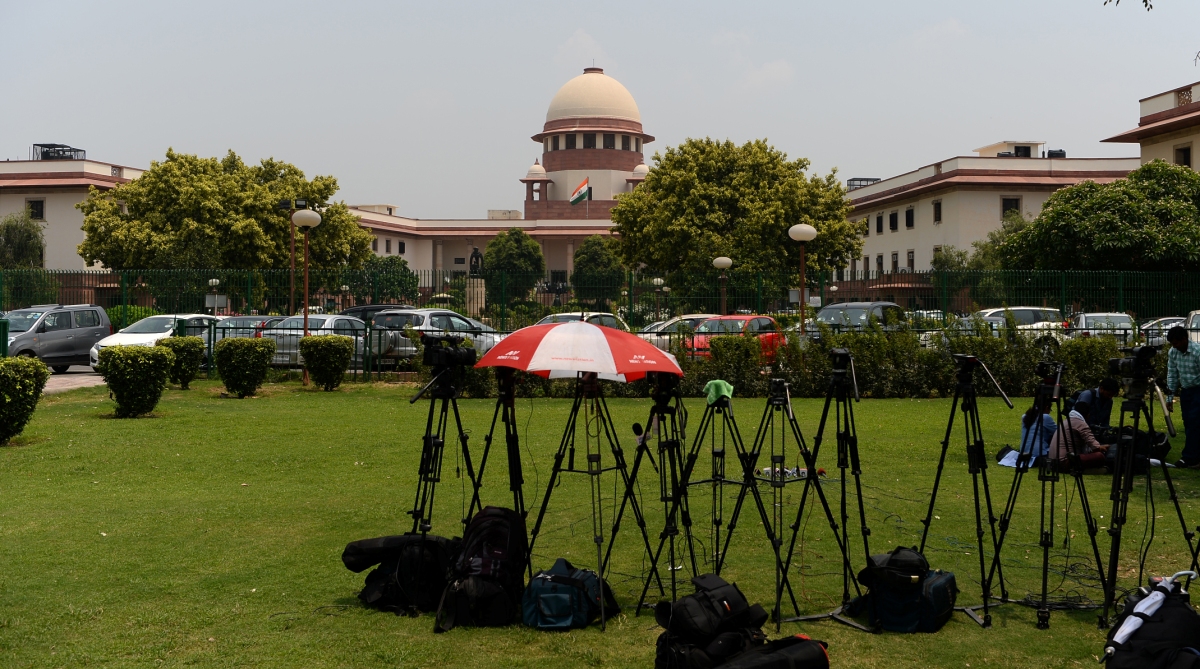India’s Got Latent: SC issues notice on YouTuber Ashish Chanchlani’s plea against FIRs
SC issues notice on YouTuber Ashish Chanchlani’s plea to quash or transfer FIR in India’s Got Latent case; tagged with Ranveer Allahabadia’s petition.
The Supreme Court rejected on Monday the review petitions filed by three of the four convicts against the death penalty awarded to them for the gangrape and murder of a 23-year-old paramedic student on 16 December 2012.

(Photo: AFP PHOTO / Sajjad HUSSAIN)
The Supreme Court rejected on Monday the review petitions filed by three of the four convicts against the death penalty awarded to them for the gangrape and murder of a 23-year-old paramedic student on 16 December 2012.
A three-judge bench comprising Chief Justice Dipak Misra, Justice R Banumathi and Justice Ashok Bhushan upheld the death sentence awarded to Mukesh, Pawan Gupta and Vinay Sharma while dismissing their plea to change the capital punishment to life imprisonment.
Advertisement
The fourth death-row convict, Akshay Kumar Singh, had not filed a review petition against the apex court’s 5 May 2017 order.
Advertisement
Reacting to the decision, Asha Devi, the mother of the victim, said those handed death penalty were not juveniles and called for tightening of the judicial system by the judiciary so that justice doesn’t get delayed.
“Our struggle does not end here. Justice is getting delayed. It’s affecting other daughters of the society. I request judiciary to tighten their judicial system, serve justice to Nirbhaya by hanging them as soon as possible and help other girls and women,” Asha Devi was quoted as saying by ANI.
Read More: Nirbhaya gangrape-murder case convicts to be hanged
The victim’s father, Badrinath Singh, said a lot of time had gone by in the process and the sooner the convicts are hanged the better it is for the society.
“We knew that review petition will be dismissed. But what next? So much time has gone by and threat to women has gone up in this span. I believe sooner they’re hanged, better it is,” ANI quoted him as saying.
Rohan Mahajan, the lawyer of the victim’s family, said the Centre would have to expedite whatever process was to be followed now.
Here is a timeline:
2012
16 December: Nirbhaya gang-raped and brutalised in a moving bus by six men, including a juvenile. After committing the act and beating up her friend, they throw both of them out of the moving bus.
18 December: Four accused arrested. They are identified as Ram Singh, his brother Mukesh, Vinay Sharma and Pawan Gupta. Hunt for two others, one of them a juvenile, continues.
20 December: Statement of Nirbhaya’s friend recorded.
21 December: Juvenile accused arrested from Anand Vihar bus terminal in Delhi.
22 December: The sixth accused, identified as Ajay Thakur, nabbed from Aurangabad in Bihar. The victim records her statement in hospital before the SDM.
23 December: Major protests demanding justice for the victim break out in Delhi.
25 December: Constable Subhash Tomar succumbs to injuries suffered during the protests.
26 December: Victim suffers cardiac arrest. She is flown to Singapore for treatment at Mount Elizabeth Hospital.
29 December: Victim passes away at 2:15 am. Murder charge added to the FIR against 6 accused.
2013
2 January: Chief Justice of India Altamas Kabir inaugurates fast track court for speedy trial in the case.
3 January: Chargesheet filed against five adults. They are accused of murder, gangrape, attempt to murder, kidnapping, unnatural offences and dacoity.
17 January: Proceedings against the accused begin in court.
11 March: Main accused Ram Singh commits suicide in Tihar Jail.
22 March: Delhi High Court grants permission to media to report on court proceedings.
31 August: Principal District Magistrate Geetanjali Goel, Juvenile Justice Board, convicts the minor accused for gangrape and send him to three years in probation home.
13 September: Additional Sessions Judge Yogesh Khanna sentences four remaining accused to death.
2014
13 March: Delhi High Court upholds the trial court verdict. Bench of Justice Reva Khetrapal and Justice Pratibha Rani says sentence was upheld as an “exemplary punishment” in the hope of stemming the “rising trend” of sexual assault in India.
15 March: Supreme Court stays execution of the accused. The order comes as some section alleged that the accused were not given a fair trial.
18 December: Delhi High Court refuses to stay release of the minor accused after completion of three years in a juvenile home. The Centre wanted his detention extended citing intelligence inputs that he had been radicalised inside the home.
20 December: Juvenile walks free.
2016
3 April: Bench of Justice Dipak Misra, Justice V Gopala Gowda and Justice Kurian Joseph begin hearing the case in the Supreme Court.
8 April: Senior advocates Raju Ramachandran and Sanjay Hegde appointed Amicus Curiae.
29 August: Allegation comes to the fore of the police tampering with evidence.
2 September: Advocate ML Sharma, defence counsel, concludes his submissions.
7 November: Raju Ramachandran argues for the sentencing order to be set aside.
28 November: Sanjay Hegde argues against reliability of evidence in the case.
2017
6 January: The SC seeks mitigating circumstances from the accused.
3 February: Petitioners contend that there have been violations in procedure. Apex court decides to re-hear the case on the sentencing aspect.
6 March: All accused submit additional affidavits in the court.
27 March: Almost a year after hearing the case, the SC bench reserves verdict.
5 May: SC upholds death sentence of the four convicts.
13 November: Court agrees to hear review petition filed by the convicts who argued that their sentencing is “cold-blooded killing in the name of Justice”.
2018
9 July: Review pleas of three out of four convicts rejected.
Advertisement